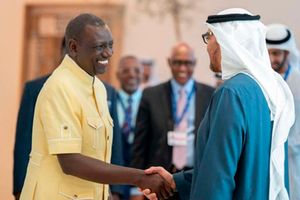Why carbon credits could manage Africa’s debt burden, spur growth

President William Ruto speaks during the High-Level Segment for Heads of State and Government session at the United Nations climate summit in Dubai on December 1, 2023.
As public debt in Africa continues to rise steadily to levels not seen in decades, many African leaders spend sleepless nights with their economic advisors, trying to craft a lasting solution to the runaway debt.
According to global financial experts at the International Monetary Fund, the average debt ratio in sub-Saharan Africa has almost doubled in the last 10 years from 30 per cent of GDP at the end of 2013 to almost 60 per cent by the end of 2022.
This has presented a massive burden to the poor nations as repaying this debt has also become much costlier, disrupting the region’s development goals as the ratio of interest payments to revenue, a key metric to assess debt servicing capacity and predict the risk of a fiscal crisis, has more than doubled since the early 2010s.
According to financial experts, this is now close to four times the ratio in advanced economies.
As of 2022, more than half of the low-income countries in sub-Saharan Africa were assessed by the IMF to be at high risk or already in debt distress.
Many countries increasingly face a mounting debt crisis and are pleading with lenders such as the World Bank and IMF to restructure their debts.
Against this background, most African countries are eyeing the carbon offsets market as a source of capital to overcome the credibility crisis.
President William Ruto sees carbon credits as Kenya’s “next significant export”.
“We are finalising the regulations, and they are on their way to parliament because we want to bring integrity into the whole carbon space of carbon credit and market,” said President Ruto at COP28 in Dubai, United Arab Emirates.
Climate change experts estimate that Africa’s forests can absorb 600 million tonnes of carbon dioxide each year, more than any forest ecosystem on Earth.
At least 11 per cent of carbon credits issued globally came from African projects.
The African Carbon Markets Initiative hopes to produce 300 million carbon credits annually by 2030, but some countries need more support due to bad governance.
During the September African Climate Summit in Nairobi, a coalition of major UAE energy and financial companies indicated its intention to buy $450 million of carbon credits generated in Africa by 2030.
According to the Executive Secretary of the United Nations Economic Commission for Africa (ECA), Claver Gatete, Africa can generate $82 billion from carbon credits.
Speaking at the COP28 in Dubai, Mr Gatete said the financial disparity is more than one and a half times the amount the continent gets from donor funding.
Explainer: What you should know about carbon credits
Mr Gatete said the UN Commission for Africa is working with member countries to develop carbon credit frameworks.
“The market has not been fair. In some countries, it goes up to over $100 per tonne. But in the African countries, it goes up to below $10 per tonne. The market is not fair. We are now helping the countries to do it properly, to have registries, to have the protocols that conform to the international standards so that they can get the better price for your mineral,” said Mr Gatete.
Powering Africa’s push for carbon credits is the African Carbon Markets Initiative (ACMI), which was launched at COP27 in Sharm el Sheikh in Egypt last year.
The group brings together nations including Kenya, Nigeria, Gabon, and Western philanthropies like the Rockefeller Foundation and Bezos Earth Fund.
The ACMI’s head, Paul Muthaura, says there is an appetite for African carbon credits.
“There is often a sentiment that African credits are not equivalent to those from other regions,” said Mr Muthaura.
Mr Damilola Ogunbiyi, CEO and Special Representative of the UN Secretary-General for Sustainable Energy for All and Co-Chair of UN-Energy, states that the African carbon market Initiative will be a transformational opportunity for Africa.
“It can unlock billions in climate finance to support economies while expanding energy access, creating jobs, safeguarding biodiversity, and driving climate action towards our joint Paris goals.”
Mr Joseph Nganga,the vice president of Africa for the Global Energy Alliance for People and Planet, noted that current levels of climate finance fall short of Africa’s needs.
“The continent requires $3 trillion to implement its aspect of the Paris Agreement, yet less than US$20 billion was provided to Africa between 2016 and 2019. Voluntary carbon markets can play a crucial role in filling this financial gap,” he said. “The Africa Carbon Markets Initiative can help us achieve a more rapid and equitable energy transition for Africa, a transition that supports lives and livelihoods with clean, reliable energy while countering the existential threat of our time, climate change.”
Executive Secretary of the United Nations Economic Commission for Africa, Antonio Pedro, said Africa is at the centre of the opportunity to develop the voluntary carbon credit market in a way that accelerates climate action, fosters shared value creation, and creates sustainable livelihoods for communities.
“The Africa Carbon Markets Initiative aims to provide realistic, transparent, and reliable pathways for investment,” said Antonio.
Mr Bogolo Kenewendo, Special Adviser and Africa Director of the Climate Champions Team, said Africa is undoubtedly the nature-positive economic superpower of the world.
“With access to the global voluntary carbon market, valuing and commercialising natural assets could unlock new financing opportunities for development for Africa,” he said.
[email protected]. This report was produced with support from MESHA and IDRC Southern Africa office.





